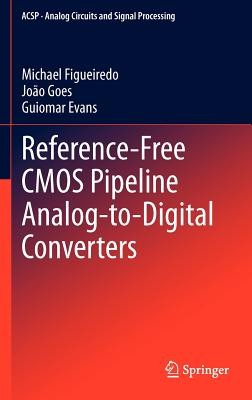
- We will send in 10–14 business days.
- Author: Michael Figueiredo
- Publisher: Springer
- ISBN-10: 1461434661
- ISBN-13: 9781461434665
- Format: 15.6 x 23.4 x 1.3 cm, hardcover
- Language: English
- SAVE -10% with code: EXTRA
Reference-Free CMOS Pipeline Analog-To-Digital Converters (e-book) (used book) | bookbook.eu
Reviews
Description
This book shows that digitally assisted analog to digital converters are not the only way to cope with poor analog performance caused by technology scaling. It describes various analog design techniques that enhance the area and power efficiency without employing any type of digital calibration circuitry. These techniques consist of self-biasing for PVT enhancement, inverter-based design for improved speed/power ratio, gain-of-two obtained by voltage sum instead of charge redistribution, and current-mode reference shifting instead of voltage reference shifting. Together, these techniques allow enhancing the area and power efficiency of the main building blocks of a multiplying digital-to-analog converter (MDAC) based stage, namely, the flash quantizer, the amplifier, and the switched capacitor network of the MDAC. Complementing the theoretical analyses of the various techniques, a power efficient operational transconductance amplifier is implemented and experimentally characterized. Furthermore, a medium-low resolution reference-free high-speed time-interleaved pipeline ADC employing all mentioned design techniques and circuits is presented, implemented and experimentally characterized. This ADC is said to be reference-free because it precludes any reference voltage, therefore saving power and area, as reference circuits are not necessary. Experimental results demonstrate the potential of the techniques which enabled the implementation of area and power efficient circuits.
EXTRA 10 % discount with code: EXTRA
The promotion ends in 18d.15:55:42
The discount code is valid when purchasing from 10 €. Discounts do not stack.
- Author: Michael Figueiredo
- Publisher: Springer
- ISBN-10: 1461434661
- ISBN-13: 9781461434665
- Format: 15.6 x 23.4 x 1.3 cm, hardcover
- Language: English English
This book shows that digitally assisted analog to digital converters are not the only way to cope with poor analog performance caused by technology scaling. It describes various analog design techniques that enhance the area and power efficiency without employing any type of digital calibration circuitry. These techniques consist of self-biasing for PVT enhancement, inverter-based design for improved speed/power ratio, gain-of-two obtained by voltage sum instead of charge redistribution, and current-mode reference shifting instead of voltage reference shifting. Together, these techniques allow enhancing the area and power efficiency of the main building blocks of a multiplying digital-to-analog converter (MDAC) based stage, namely, the flash quantizer, the amplifier, and the switched capacitor network of the MDAC. Complementing the theoretical analyses of the various techniques, a power efficient operational transconductance amplifier is implemented and experimentally characterized. Furthermore, a medium-low resolution reference-free high-speed time-interleaved pipeline ADC employing all mentioned design techniques and circuits is presented, implemented and experimentally characterized. This ADC is said to be reference-free because it precludes any reference voltage, therefore saving power and area, as reference circuits are not necessary. Experimental results demonstrate the potential of the techniques which enabled the implementation of area and power efficient circuits.


Reviews